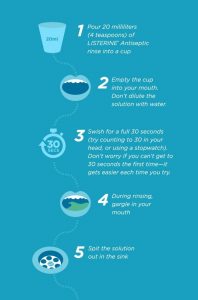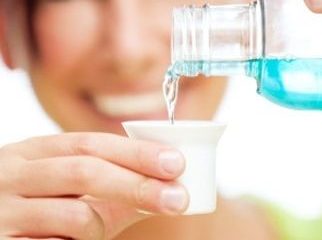Mouthwash, also called “oral rinse” or “mouth rinse,” typically contains antibacterial ingredients to clean between your teeth, as well as other ingredients that give it a flavor. Some types of mouthwash contain alcohol as an inactive ingredient, while others are alcohol-free.
Essentially, mouthwashes help with oral hygiene. They prevent or reduce cavities and fight gum disease. This makes it important to use the proper tools, which include brushing, flossing, and rinsing with a mouthwash.
The benefits of using mouthwash
According to the American Dental Association, mouthwashes are after brushing and flossing. This liquid is not to be swallowed. You only swish it in your mouth and then spit it out.
Mouthwashes are used to:
- It reduces the formation of tartar in your teeth
- Mouthwashes get rid of odor-causing bacteria and germs. This helps prevent the development of more serious dental problems like tooth decay and cavities.
- Some mouthwashes include fluoride, which is the active ingredient in most toothpaste. Fluoride protects our teeth by strengthening their enamel. This assists in preventing tooth decay.
- Your leftover lunch can fester in your mouth, leaving behind bacteria and less-than-pleasant odors. Therapeutic mouthwashes with antimicrobials, such as essential oils, can go a long way toward eliminating those lingering scents. As a result, it freshens breath and neutralizes bad odors. This gives us great smelling breath.
- It can reduce plaque and gingivitis. When combined with regular brushing and flossing, mouthwash can help flush away the pesky particles that lead to gum disease. Again, your best bet is to go with a therapeutic formula containing essential oils.
Types of mouthwashes
Mouthwashes or mouth rinses are often divided into two main categories: cosmetic and therapeutic.
Cosmetic mouthwashes
As the name says, their purpose is more for external appearances. These products work well in getting rid of and neutralizing bad breath, odors, and unwanted tastes.
However, they aren’t designed to get to the root of the problem. So, in effect, they’re temporary fixes.
These mouthwashes aren’t capable of killing bacteria or getting rid of the cause of the odors. They also don’t prevent or reduce cavities and plaque.
Therapeutic mouthwashes
Therapeutic mouth rinses meanwhile, go a step further. They work on the cause. They remove the plaque that’s left behind after brushing. This helps get rid of the cause of bad breath. It also helps prevent the development of tartar and gum disease.
While mouthwashes do a lot for oral health, there are some things they can’t do.
One is, that they can’t dislodge or remove food that’s stuck between your teeth. Swishing and gargling do help as the liquid flowing around the mouth can sometimes loosen particles that are stuck on teeth surfaces or between them. They aren’t also able to thoroughly clean each tooth’s surface. This is what toothbrushes are for. Its bristles are designed to gently glide across each tooth’s surface to scrub away any debris that’s there.
For optimal cleaning on and between teeth, brushing and flossing are needed.
A quick swig of mouthwash alone won’t cure your coffee-breath woes. Consistent brushing and flossing are the only guarantees of great oral health. Plus, cosmetic mouthwashes may only give you a temporary freshness boost, so be sure to track down a good non-alcohol-based mouthwash.
If you suffer from dry mouth, opt for an alcohol-free formula. Otherwise, mouthwash can reduce the production of saliva and worsen your condition. Also, too much alcohol can be painful for sensitive spots and open wounds. Go for a mouthwash with enzymes, cellulose, or animal mucins, which will help promote moisture.
When to use mouthwash
Some people use mouthwash as part of their daily teeth-cleaning routine. But you can also use mouthwash in a pinch to banish bad breath.
There’s really no hard and fast guideline for when to use mouthwash for bad breath. But it isn’t going to work to strengthen tooth enamel or fight gum disease unless you use it right after brushing and flossing.
For best results, teeth should be freshly cleaned before using mouthwash.
It bears repeating that mouthwash isn’t a replacement for brushing and flossing. It’s also not necessary to use mouthwash to keep your mouth clean. Most mouthwash products recommend that you use them twice per day, after brushing and flossing.
How to use mouthwash
Here are the basic instructions for most kinds of mouthwash.
1. Brush your teeth first
Start by thoroughly brushing and flossing your teeth.
If you’re brushing with fluoride toothpaste, wait a while before using mouthwash. The mouthwash can wash away the concentrated fluoride in the toothpaste.
2. How much mouthwash to use
Pour your oral rinse of choice into the cup provided with the product or a plastic measuring cup. Use only as much mouthwash as the product instructs you to use. It’s typically between 3 and 5 teaspoons.
3. Ready, set, rinse
Empty the cup into your mouth and swish it around. Don’t swallow it. Mouthwash isn’t meant for ingesting, and it won’t work if you drink it.
While you’re rinsing, gargle for 30 seconds. You may want to set a watch or try to count to 30 in your head.
4. Spit it out
Spit the mouthwash out into the sink.

Some tips about mouthwash:
- It can be diluted 1:1 with water if you have the sensitivity or if it feels too strong
- Beyond regular brushing and flossing, mouthwash can round out your dental routine and deliver a slew of health benefits but is not a replacement
- Fluoride can be toxic when swallowed, so never consume oral rinses, and avoid giving them to children under the age of 6
- Mouthwash, also called oral rinse, is a liquid product used to rinse your teeth, gums, and mouth. It usually contains an antiseptic to kill harmful bacteria that can live between your teeth and on your tongue.
- Some people use mouthwash to fight against bad breath, while others use it to try to prevent tooth decay.
- Mouthwash doesn’t replace brushing your teeth or flossing in terms of oral hygiene, and it’s only effective when used correctly. It’s also important to understand that different product formulas contain different ingredients, and not all mouthwashes can strengthen your teeth.
- The one thing that all dentists will tell you is that rinsing with a mouthwash along is not a substitute for brushing or flossing. It is meant to complement them by providing extra protection against cavities and gum disease.
- If you have open sores or oral lesions in your mouth, you might want to try using mouthwash to kill bacteria and speed healing. But you should speak to a dentist before using an oral rinse in your mouth if you have recurring oral lesions.
- Sores in your mouth can be caused by underlying health issues, and dousing those sores with fluoride and antiseptic could be doing more harm than good.
To sum up, mouthwashes or mouth rinses are a great tool for maintaining healthy teeth and gums. They’re meant to be used with brushing and flossing to ensure good dental health. Together these tools prevent cavity and gum disease. They also ensure that your pearly whites stay clean.

